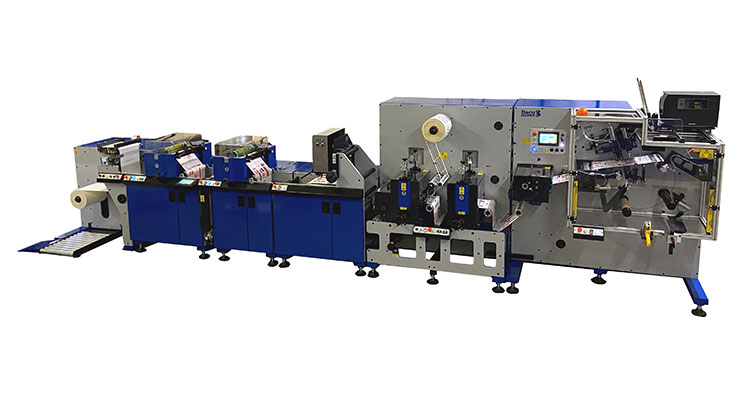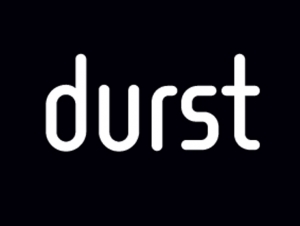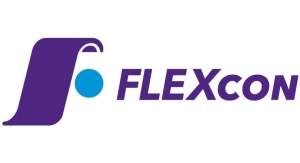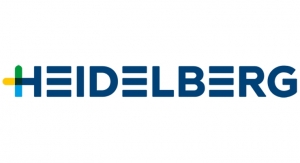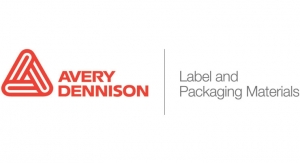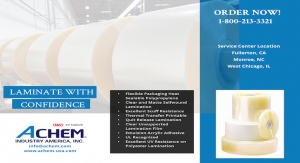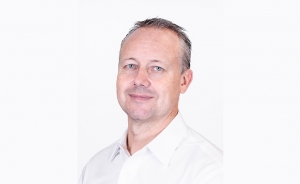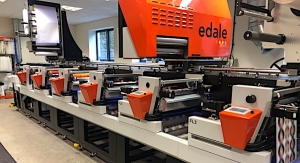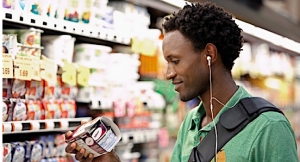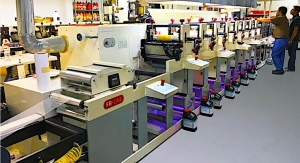John Penhallow06.03.21
The “digital drupa” show, which closed on April 23, was hailed (by the organizers) as getting “excellent feedback internationally, as demonstrated by the impressive final statistics.” Well, up to a point. Just over 200 virtual exhibitors took part, compared with 1,828 at drupa 2016. The only major narrow web press manufacturers to exhibit were Omet and Bobst.
Benny Landa had sworn to exhibit and was faithful to his word, but overall, this year’s virtual show had little to attract anyone in the label business. This year’s drupa conference program, on the other hand, was well-attended with five special forums on subjects, including artificial intelligence, the connected consumer, and the circular economy.
The show’s organizers deserve a pat on the back for this, with just the caveat that in this locked-down world, conferences are two-a-penny. All being well, Dusseldorf in May 2024 will ring to the sound of machines whirring and beer glasses clinking. But whether it be drupa, Labelexpo or any other show, it will take time and persuasion before the equipment manufacturers, who are the mainstay of trade shows, sign on the dotted line.
Plastics for packaging
Many environmentalists may feel a small frisson of Schadenfreude when they learn that Germany’s industry association for producers of plastic packaging has sent out a distress call. Raw material shortages and steeply rising prices are throwing a spanner into the works of this smoothly run industry. Rising petroleum feedstock prices are the main culprit, causing price hikes of over 40% since January for PP, PE and other materials widely used in packaging and label production.
The association condemns producers for their cavalier treatment of their customers: Martin Engelmann, association chairman, says, “While some suppliers provide a detailed explanation and regularly inform their customers about the measures taken, as well as time horizons, others consider the simple reference to ‘unforeseeable circumstances’ to be sufficient to justify force majeure. When it comes to transparency, the industry as a whole must do better.” You said it, Doc.
Recyclers say: Less plastic is not always a good thing
Brand owners and retailers in Europe are coming under fire (and rightly) for using composite paper/plastic packaging with slogans like “40% less plastic,” ignoring the fact that they said composites are hard or impossible to recycle. This is pure “greenwashing,” according to recycling expert Isabell Schmidt.
It can be argued that “pure” plastic packaging is also difficult to recycle, but Schmidt insists,“If the special properties of plastic are important for the packaging, then paper fibers should be completely dispensed with and a fully recyclable plastic packaging should be chosen.”
When it comes to recycling paper-based materials, you need a properly equipped paper mill, and that is at the root of a year-long controversy here in France. UPM’s century-old mill at Chapelle Darblay does just that, recycling 350,000 tons of used paper per year. Does, or rather did, since the site is due to be finally closed down in June of this year, with the loss of 220 jobs.
Local authorities, unions and ecologists are all up in arms. Chapelle Darblay is 40% of France’s paper recycling capacity, but major groups like Stora Enso, IP and Mondi are showing little interest, and UPM is said to be more interested in closing the plant and selling off
the equipment.
Some go up, some go down
Over the Rhine in Germany, another famous name in the paper industry has just bitten the dust: Zanders has been going strong for nearly 200 years, surviving revolutions, depressions and two world wars. But on April 30, 2021, this maker of Chromolux packaging papers finally gave up the ghost, throwing 380 employees out of work.
It is a different story with labelstock producer Herma, who remains cautiously optimistic. “In 2020, business with self-adhesive materials, labels and labeling machines grew by around 5% to 381 million euros ($460 million),” says Sven Schneller, Herma’s managing director.
Herma expanded its role as a leading supplier of logistics labels for shippers and recorded good figures with pharmaceutical and healthcare solutions. Herma’s international business this year is being held back by the pandemic and by Brexit (Britain is one of its biggest export markets). As with many other industries, Herma is also afflicted by rocketing sea and airfreight rates, to say nothing of the accidental blocking of the Suez Canal in March, which seriously delayed deliveries of labelstock to some of its Asia-Pacific customers.
Also in Germany, the world number one printing machinery manufacturer Heidelberg is showing the same cautious optimism. Restructuring is the name of the game for Heidelberg, which is moving into non-print-related fields after its unsuccessful attempt to sell off Gallus. In its financial year to March 31, 2021, Heidelberg’s sales stood at 1.9 billion euros ($2.3 billion), only slightly down on the previous year. This better-than-expected result, according to CEO Rainer Hundsdörfer, was in part thanks to buoyant sales in China.
A new initiative for glassine liner recycling
Useful collection schemes promoted by major labelstock producers like Avery Dennison and UPM Raflatac have been around for a while. But used glassine, even if properly segregated, often comes in quantities too small to be economically transported. Now this problem is being addressed by Elise, a French company specializing in the collection and recycling of office waste, which in January started extending its range to cover used glassine liner. This is being done with the active cooperation of French label association UNFEA.
Since the beginning of this year, Elise, a non-profit organization that counts many handicapped people among its 400 employees, has been experimentally collecting used liner in volumes too small to interest major players such as Veolia. Now, this service is being rolled out to cover the whole of France.
“In practice, it is a matter of placing a bin at the end of the packaging line to store the glassine. When the bin is full, you just call Elise to collect it,” explains Pierre Forcade, general manager of UNFEA.
Volumes as small as three pallets can be collected if production is regular, according to Sophie Bayoux, general manager of Elise. Elise is working with Cycle4green, and the waste liner is being aggregated for shipment to Lenzing Papier in Austria for recycling. Brand owners and label converters using this service can also benefit from a tax break; this means, according to Petri Tani of Cycle4Green, that the whole collection and recycling operation makes economic sense.
In at the finish
Daco Solutions is a relatively recent entrant to the label finishing business. At its plant in the North of England, Daco makes slitter-rewinders, diecutters and other narrow web equipment. The company sells internationally but most of its business is with UK label converters. A typical customer is Acorn Labels, which has over the years installed 17 Daco converting lines.
Acorn’s latest investment is a 2-color TD350 label converter with a fully automatic turret rewind module, two diecutting stations and a mono UV inkjet module. Daco’s plant is only a stone’s throw from the headquarters of AB Graphic, a much larger competitor. But not being an international heavyweight doesn’t bother Daco. As they say in the North of England, “Good beer comes in small bottles.”
Yet more M&A
Spanish label and packaging converters tend to look to Latin America for their acquisition projects, but Printeos, based in Alcala de Henares, recently acquired Label Makers, a specialty label manufacturer based in Bradford, UK. This latest acquisition will join other group companies in France, Portugal, Poland and the Czech Republic. Printeos, with 21 production plants and $290 million sales, is now well into the top 10 European label converters.
At a more modest level, Brodart’s takeover of Criaud Etiquettes is a Franco-French affair. Brodart has been in the flexible packaging business almost since its founding over a century ago but has clearly decided that now is the time to move into labels. Criaud, also a family-owned company, but a juvenile of just 60 years standing, produces 400 million labels per year mostly for the food, cosmetics and logistics sectors.
Olivier Laulan seems to be a rising force in France’s, and soon perhaps Europe’s, label business. The boss of Alliance Etiquettes has dropped his financial backer Activa and fallen in with the investment fund Chequers Capital. Laulan is looking to Chequers to bankroll his further acquisitions, both in France and in the surrounding countries. His aim is to cross the €100 million sales mark by the end of next year.
Coronavirus – is it male or female?
In French, every noun has to be masculine or feminine, including new arrivals like coronavirus. Most writers opt for le coronavirus (or le covid), but a minority is holding out for the feminine gender. Insults are being exchanged in editorial offices. Does this mean the French are crazy? Or just that they’re happy at last to find a controversy that hasn’t (so far) put anyone in the hospital? Take your pick.
Benny Landa had sworn to exhibit and was faithful to his word, but overall, this year’s virtual show had little to attract anyone in the label business. This year’s drupa conference program, on the other hand, was well-attended with five special forums on subjects, including artificial intelligence, the connected consumer, and the circular economy.
The show’s organizers deserve a pat on the back for this, with just the caveat that in this locked-down world, conferences are two-a-penny. All being well, Dusseldorf in May 2024 will ring to the sound of machines whirring and beer glasses clinking. But whether it be drupa, Labelexpo or any other show, it will take time and persuasion before the equipment manufacturers, who are the mainstay of trade shows, sign on the dotted line.
Plastics for packaging
Many environmentalists may feel a small frisson of Schadenfreude when they learn that Germany’s industry association for producers of plastic packaging has sent out a distress call. Raw material shortages and steeply rising prices are throwing a spanner into the works of this smoothly run industry. Rising petroleum feedstock prices are the main culprit, causing price hikes of over 40% since January for PP, PE and other materials widely used in packaging and label production.
The association condemns producers for their cavalier treatment of their customers: Martin Engelmann, association chairman, says, “While some suppliers provide a detailed explanation and regularly inform their customers about the measures taken, as well as time horizons, others consider the simple reference to ‘unforeseeable circumstances’ to be sufficient to justify force majeure. When it comes to transparency, the industry as a whole must do better.” You said it, Doc.
Recyclers say: Less plastic is not always a good thing
Brand owners and retailers in Europe are coming under fire (and rightly) for using composite paper/plastic packaging with slogans like “40% less plastic,” ignoring the fact that they said composites are hard or impossible to recycle. This is pure “greenwashing,” according to recycling expert Isabell Schmidt.
It can be argued that “pure” plastic packaging is also difficult to recycle, but Schmidt insists,“If the special properties of plastic are important for the packaging, then paper fibers should be completely dispensed with and a fully recyclable plastic packaging should be chosen.”
When it comes to recycling paper-based materials, you need a properly equipped paper mill, and that is at the root of a year-long controversy here in France. UPM’s century-old mill at Chapelle Darblay does just that, recycling 350,000 tons of used paper per year. Does, or rather did, since the site is due to be finally closed down in June of this year, with the loss of 220 jobs.
Local authorities, unions and ecologists are all up in arms. Chapelle Darblay is 40% of France’s paper recycling capacity, but major groups like Stora Enso, IP and Mondi are showing little interest, and UPM is said to be more interested in closing the plant and selling off
the equipment.
Some go up, some go down
Over the Rhine in Germany, another famous name in the paper industry has just bitten the dust: Zanders has been going strong for nearly 200 years, surviving revolutions, depressions and two world wars. But on April 30, 2021, this maker of Chromolux packaging papers finally gave up the ghost, throwing 380 employees out of work.
It is a different story with labelstock producer Herma, who remains cautiously optimistic. “In 2020, business with self-adhesive materials, labels and labeling machines grew by around 5% to 381 million euros ($460 million),” says Sven Schneller, Herma’s managing director.
Herma expanded its role as a leading supplier of logistics labels for shippers and recorded good figures with pharmaceutical and healthcare solutions. Herma’s international business this year is being held back by the pandemic and by Brexit (Britain is one of its biggest export markets). As with many other industries, Herma is also afflicted by rocketing sea and airfreight rates, to say nothing of the accidental blocking of the Suez Canal in March, which seriously delayed deliveries of labelstock to some of its Asia-Pacific customers.
Also in Germany, the world number one printing machinery manufacturer Heidelberg is showing the same cautious optimism. Restructuring is the name of the game for Heidelberg, which is moving into non-print-related fields after its unsuccessful attempt to sell off Gallus. In its financial year to March 31, 2021, Heidelberg’s sales stood at 1.9 billion euros ($2.3 billion), only slightly down on the previous year. This better-than-expected result, according to CEO Rainer Hundsdörfer, was in part thanks to buoyant sales in China.
A new initiative for glassine liner recycling
Useful collection schemes promoted by major labelstock producers like Avery Dennison and UPM Raflatac have been around for a while. But used glassine, even if properly segregated, often comes in quantities too small to be economically transported. Now this problem is being addressed by Elise, a French company specializing in the collection and recycling of office waste, which in January started extending its range to cover used glassine liner. This is being done with the active cooperation of French label association UNFEA.
Since the beginning of this year, Elise, a non-profit organization that counts many handicapped people among its 400 employees, has been experimentally collecting used liner in volumes too small to interest major players such as Veolia. Now, this service is being rolled out to cover the whole of France.
“In practice, it is a matter of placing a bin at the end of the packaging line to store the glassine. When the bin is full, you just call Elise to collect it,” explains Pierre Forcade, general manager of UNFEA.
Volumes as small as three pallets can be collected if production is regular, according to Sophie Bayoux, general manager of Elise. Elise is working with Cycle4green, and the waste liner is being aggregated for shipment to Lenzing Papier in Austria for recycling. Brand owners and label converters using this service can also benefit from a tax break; this means, according to Petri Tani of Cycle4Green, that the whole collection and recycling operation makes economic sense.
In at the finish
Daco Solutions is a relatively recent entrant to the label finishing business. At its plant in the North of England, Daco makes slitter-rewinders, diecutters and other narrow web equipment. The company sells internationally but most of its business is with UK label converters. A typical customer is Acorn Labels, which has over the years installed 17 Daco converting lines.
Acorn’s latest investment is a 2-color TD350 label converter with a fully automatic turret rewind module, two diecutting stations and a mono UV inkjet module. Daco’s plant is only a stone’s throw from the headquarters of AB Graphic, a much larger competitor. But not being an international heavyweight doesn’t bother Daco. As they say in the North of England, “Good beer comes in small bottles.”
Yet more M&A
Spanish label and packaging converters tend to look to Latin America for their acquisition projects, but Printeos, based in Alcala de Henares, recently acquired Label Makers, a specialty label manufacturer based in Bradford, UK. This latest acquisition will join other group companies in France, Portugal, Poland and the Czech Republic. Printeos, with 21 production plants and $290 million sales, is now well into the top 10 European label converters.
At a more modest level, Brodart’s takeover of Criaud Etiquettes is a Franco-French affair. Brodart has been in the flexible packaging business almost since its founding over a century ago but has clearly decided that now is the time to move into labels. Criaud, also a family-owned company, but a juvenile of just 60 years standing, produces 400 million labels per year mostly for the food, cosmetics and logistics sectors.
Olivier Laulan seems to be a rising force in France’s, and soon perhaps Europe’s, label business. The boss of Alliance Etiquettes has dropped his financial backer Activa and fallen in with the investment fund Chequers Capital. Laulan is looking to Chequers to bankroll his further acquisitions, both in France and in the surrounding countries. His aim is to cross the €100 million sales mark by the end of next year.
Coronavirus – is it male or female?
In French, every noun has to be masculine or feminine, including new arrivals like coronavirus. Most writers opt for le coronavirus (or le covid), but a minority is holding out for the feminine gender. Insults are being exchanged in editorial offices. Does this mean the French are crazy? Or just that they’re happy at last to find a controversy that hasn’t (so far) put anyone in the hospital? Take your pick.

